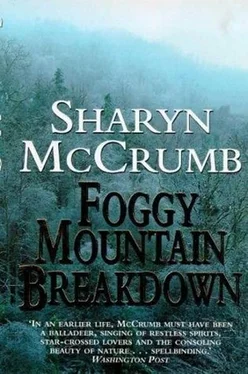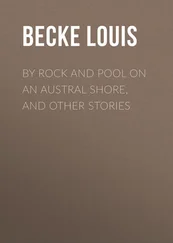Sharyn McCrumb - Foggy Mountain Breakdown and Other Stories
Здесь есть возможность читать онлайн «Sharyn McCrumb - Foggy Mountain Breakdown and Other Stories» весь текст электронной книги совершенно бесплатно (целиком полную версию без сокращений). В некоторых случаях можно слушать аудио, скачать через торрент в формате fb2 и присутствует краткое содержание. Жанр: Детектив, на английском языке. Описание произведения, (предисловие) а так же отзывы посетителей доступны на портале библиотеки ЛибКат.
- Название:Foggy Mountain Breakdown and Other Stories
- Автор:
- Жанр:
- Год:неизвестен
- ISBN:нет данных
- Рейтинг книги:3 / 5. Голосов: 1
-
Избранное:Добавить в избранное
- Отзывы:
-
Ваша оценка:
- 60
- 1
- 2
- 3
- 4
- 5
Foggy Mountain Breakdown and Other Stories: краткое содержание, описание и аннотация
Предлагаем к чтению аннотацию, описание, краткое содержание или предисловие (зависит от того, что написал сам автор книги «Foggy Mountain Breakdown and Other Stories»). Если вы не нашли необходимую информацию о книге — напишите в комментариях, мы постараемся отыскать её.
Foggy Mountain Breakdown and Other Stories — читать онлайн бесплатно полную книгу (весь текст) целиком
Ниже представлен текст книги, разбитый по страницам. Система сохранения места последней прочитанной страницы, позволяет с удобством читать онлайн бесплатно книгу «Foggy Mountain Breakdown and Other Stories», без необходимости каждый раз заново искать на чём Вы остановились. Поставьте закладку, и сможете в любой момент перейти на страницу, на которой закончили чтение.
Интервал:
Закладка:
“He was working?” said Rose.
“Yes. I looked at the paper under poor Mr. Hawkins’s hand when we examined his body. Of course, we can’t remove the actual paper from the room. I’m sure the police would object to that, but I did make a copy while I was waiting for the hotel manager to arrive. Would you like to see it?” She fished a sheet of hotel stationery out of the pocket of her robe and handed it to Rose.
“Read it aloud!” Snowfield called out. The others nodded assent.
“Oh, all right,” grumbled the mystery writer. “I knew you would find some way to turn this into a poetry reading.” Holding the paper at arm’s length, she squinted at the spidery writing, and recited:
There’s this guy .
his name is Norman
and he’s sitting in a white room .
he’s sitting in a white room ,
but you might as well call it
white death .
Norman is holding death like
a white peach to the window
and turning ,
turning death
like the dial of a timer
in the white light of the sun .
death begins to tick .
Norman puts death down
and stares with his white eyes
at the white wall .
his shadow is white and moves
without him around the white room .
then death goes off .
She lowered the paper and blinked at the assortment of poets. “That is the most stupid and pointless thing I have ever read. Do any of you bards get any meaning out of that?”
Jess Scarberry shrugged. “Shucks, ma’am, these professor types don’t have to make sense. If you don’t understand what they write, they reckon it’s your fault.”
Snowfield scowled at him. “It seems clear enough to me. Hawkins was obviously contemplating his own mortality. Perhaps he had a premonition. Keats did.”
Rose Hanelon rolled her eyes. “Keats had medical training and symptoms of tuberculosis. I’d hardly call that a premonition. I should have thought that if Hawkins foresaw his own murder, he’d have gotten out of there, rather than sit down and write a poem about it. Still, with poets, you never know.”
“Who’s Norman?” asked Margie with a puzzled frown.
“A metaphor for Everyman,” said Carter Jute.
Connie Samari snickered. “ Everyman . How typical of the male poet’s arrogance! And I think that poem stinks!”
“I expect it’s over your head,” said Snowfield.
Amy Dillow returned just then with a sheaf of dot matrix-printed papers. “Here’s my thesis on Hawkins. It isn’t finished, of course, but you may find it helpful.”
“A polygraph machine would be helpful,” said Rose. “Reading this is an act of desperation. But it will have to do. Pour me some of that coffee.” She settled down on one of the sofas and began to read, while the bickering went on about her.
Carter Jute handed a cup of coffee to Amy Dillow. “It’s such a shame about poor old Hawkins,” he said. “By the way, Amy, do you have a copy of his current vitae?”
“Why do you ask?”
Jute gave her a boyish smile. “Well, I was thinking what a void his passing will leave in literary circles. There were certain editorial positions he held, and workshops that he taught year after year-”
“And you thought you’d apply for them?” Amy Dillow looked shocked.
“He’d want someone to carry on his work,” Jute assured her.
Connie Samari laughed. “And heaven forbid that his honors should go to someone outside the old-boy network, right?”
Margie Collier looked dismayed to be caught in such a maelstrom of ill will. She had always thought of poets as gentle people, wandering lonely as a cloud while they composed their little odes to nature. “Why don’t we all try to write a poem in memory of poor Dr. Hawkins?” she suggested. “Does anyone do haiku?”
Rose Hanelon looked up from her reading. “You say here that Hawkins was married.”
“He’s divorced,” said Amy.
“From whom?”
“A librarian named Dreama Belcher. They didn’t have any children, though.”
“Just as well,” muttered Snowfield, shuddering. “Imagine what the progeny of someone named Dreama Belcher would look like!”
“What became of her?”
“I don’t know,” said Amy. “Nothing much, I expect. She didn’t have the temperament to be married to a poet.”
“She preferred monogamy, I expect,” said Samari. “I’ve often thought that male poets were reincarnations of walruses. Can’t you just picture them up there on a rock, surrounded by a herd of sunbathing cow-wives?”
Jess Scarberry reddened. “It’s understandable,” he said. “Poets need inspiration like a car needs a battery. If you’re writing love poems, you need something to jumpstart the creative process.”
Rose Hanelon ignored him. “Walruses,” she echoed. “That’s interesting. So John Clay Hawkins was… er… Byronic. That could have been hazardous to his health. Especially if one of his girlfriends objected to his philandering. Are any of his conquests here?” She peered at Amy Dillow with a glint of malicious interest.
The young graduate student blushed and looked away. “Certainly not!” she murmured. “I was solely interested in his work.”
“Don’t look at me,” said Connie Samari. “I met him for the first time tonight. And he definitely wasn’t my type.”
“Yes, but if you went to his room to discuss your poetry, and he made a pass at you, you might have killed him by accident, trying to fend him off.”
“If I had, I would have called a press conference to announce it,” said Samari. “I certainly wouldn’t have fled the scene and denied it.”
Jute and Snowfield, seated on either side of her, unobtrusively edged away. Jess Scarberry crossed his legs and whistled tunelessly. Rose Hanelon went back to reading the thesis.
“Would anybody like more coffee?” asked Margie nervously.
After a few moments of uneasy silence, the poets returned to the topic of Hawkins and the professional repercussions that would ensue.
“Wasn’t he set to do a guest professorship in Virginia this summer?” asked Snowfield.
“Probably. I know he was slated to write the introduction to the Regional Poets Anthology,” said Samari. “Had he written that?”
Amy Dillow shrugged. “Not that I know of.”
“I was thinking of applying for his slot at Bread Loaf,” mused Carter Jute.
“There’ll never be another John Clay Hawkins,” Amy Dillow assured them. “He was the greatest poet of our region.”
“Oh, come now!” Snowfield protested. “You ladies always say that about a good-looking fellow who reads well.”
“Oh, don’t be such a dinosaur!” said the graduate student. “I loved Hawkins’s work before I even knew what he looked like. He’s one of the few original voices in contemporary poetry. The fact that he was a drunk and a lecher is neither here nor there.”
Rose Hanelon was wondering if Detective Joe Villanova was awake at-what was it?-four A.M. Probably not. He wouldn’t be much better at this than she would, though, with no forensic evidence to go on. “Oh, well,” said Rose. “Even if I don’t figure out who the murderer is, all of you will be too exhausted tomorrow to commit any more murders, no matter which of you is guilty.”
Carter Jute consulted his watch. “Gosh, that’s right! We all have to be on panels tomorrow. Or rather, today. And we still haven’t decided what to do with Hawkins’s hour.”
The others stood up, yawned and stretched. “Long day,” they murmured.
“Wait! I’m not finished!” Rose was still riffling through the clues. “Is anyone here named Norman?” she asked in tones of desperation. “Does anyone know Hawkins’s ex-wife?”
Читать дальшеИнтервал:
Закладка:
Похожие книги на «Foggy Mountain Breakdown and Other Stories»
Представляем Вашему вниманию похожие книги на «Foggy Mountain Breakdown and Other Stories» списком для выбора. Мы отобрали схожую по названию и смыслу литературу в надежде предоставить читателям больше вариантов отыскать новые, интересные, ещё непрочитанные произведения.
Обсуждение, отзывы о книге «Foggy Mountain Breakdown and Other Stories» и просто собственные мнения читателей. Оставьте ваши комментарии, напишите, что Вы думаете о произведении, его смысле или главных героях. Укажите что конкретно понравилось, а что нет, и почему Вы так считаете.












